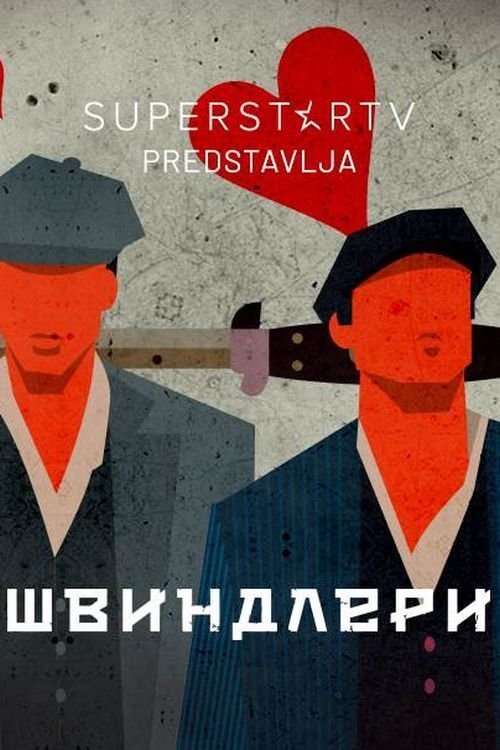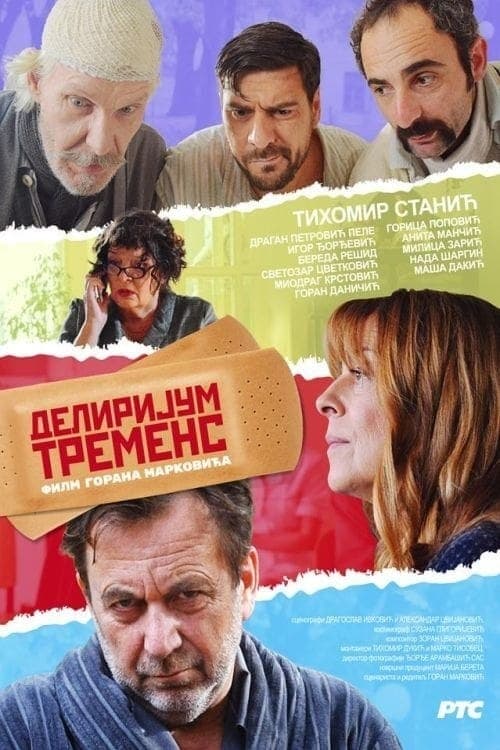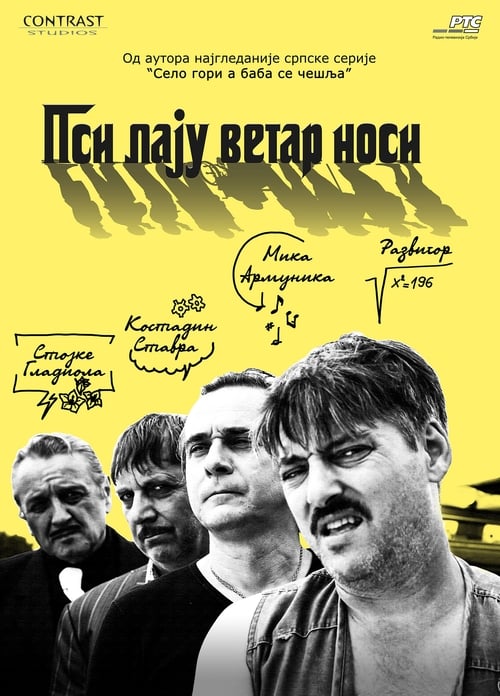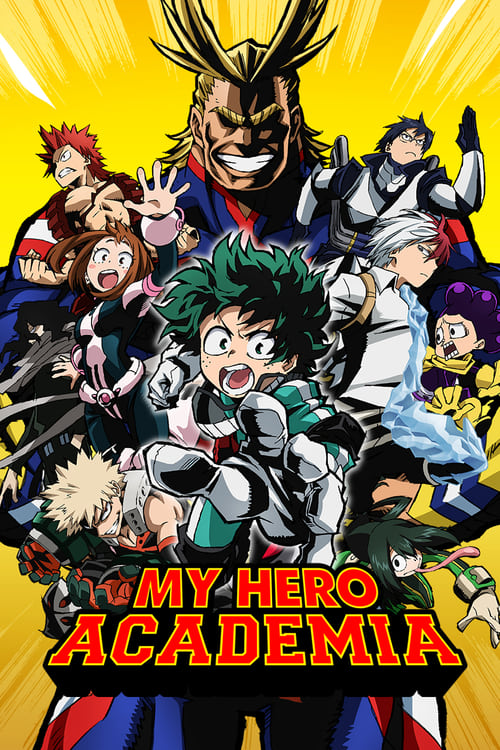
Ask Your Own Question
What is the plot?
In the twelfth episode of "Mamini sinovi," titled "Ko drži daljinski, odredjuje pravila," the story begins with the family gathered in the living room, where a heated debate arises over what to watch on television. The remote control becomes a symbol of power, and each family member believes they should have the right to choose the program. The atmosphere is charged with tension as everyone expresses their preferences, leading to a chaotic scene filled with laughter and frustration.
As the argument escalates, the father, who is trying to maintain peace, suggests a compromise: they should take turns choosing what to watch. However, this suggestion is met with resistance, particularly from the eldest son, who feels that his choices are often overlooked. He passionately argues for his right to control the remote, citing his age and maturity as reasons for his authority in the household.
The mother, sensing the growing conflict, intervenes and proposes a game to determine who gets to hold the remote for the evening. This idea is met with mixed reactions, but ultimately, the family agrees to play a series of challenges. The first challenge involves a trivia quiz about their favorite shows, which leads to playful banter and reveals hidden knowledge about each other's tastes. The youngest sibling surprises everyone with his extensive knowledge, winning the first round and gaining temporary control of the remote.
With the remote now in the hands of the youngest, the family settles in to watch a cartoon. However, the eldest son quickly grows impatient, feeling that the choice is beneath him. He begins to complain loudly, which prompts the youngest to retaliate by changing the channel to a show he knows his brother dislikes. This back-and-forth continues, with each sibling trying to outsmart the other, leading to a series of humorous and frustrating moments.
As the night progresses, the family decides to introduce a new rule: whoever can make the best argument for their show gets to keep the remote for the next round. This leads to a series of passionate pitches, with each family member showcasing their favorite shows. The mother, in a surprising turn, reveals her love for a classic drama, which resonates with everyone and earns her a moment of respect.
Tensions rise again when the eldest son feels overshadowed by his mother's unexpected popularity. He confronts her, expressing his frustration about feeling dismissed in the family dynamic. This confrontation leads to a heartfelt discussion about the importance of each family member's voice and the need for everyone to feel valued. The emotional stakes are high as the family reflects on their relationships and the underlying issues that have been simmering beneath the surface.
In a pivotal moment, the father steps in to mediate, reminding everyone that the remote is just a tool for connection and enjoyment. He encourages them to focus on the shared experience rather than the competition. This moment of clarity helps to diffuse the tension, and the family agrees to watch a show that combines elements from everyone's preferences, fostering a sense of unity.
As the episode draws to a close, the family is seen laughing and enjoying their chosen program together, the earlier conflicts forgotten. The remote, once a source of division, now symbolizes their ability to come together and appreciate each other's tastes. The final scene captures the warmth of the family dynamic, highlighting the importance of compromise and understanding in their relationships.
What is the ending?
In the ending of "Mamini sinovi," season 1, episode 12 titled "Ko drzi daljinski, odredjuje pravila," the family dynamics reach a climax as the characters confront their individual desires and the consequences of their actions. The episode concludes with a resolution of the conflicts that have been brewing throughout the season, leading to a deeper understanding among the family members.
As the episode unfolds, the scene opens in the living room, where the family is gathered around the television, each member vying for control of the remote. The tension is palpable as they argue over what to watch, revealing their differing personalities and priorities. The remote becomes a symbol of power, and the struggle for it highlights the underlying conflicts within the family.
In a pivotal moment, the youngest son, who has often felt overlooked, seizes the remote and declares that he will choose the program. This act of defiance surprises the family, and they momentarily pause, reflecting on their own behaviors. The eldest son, who has been assertive and domineering, realizes that his approach has alienated his siblings. The middle child, often caught in the crossfire, begins to voice his opinions more confidently, leading to a breakthrough in communication.
As the episode progresses, the family members start to share their feelings and frustrations. The mother, who has been trying to maintain harmony, steps in to mediate the discussion. She encourages each child to express their thoughts, fostering an environment of openness. This leads to heartfelt confessions, where the eldest son admits his fear of failure, the middle child reveals his desire for recognition, and the youngest shares his feelings of inadequacy.
The climax of the episode occurs when the family decides to put the remote down and engage in a game together, symbolizing their willingness to collaborate and support one another. This shift in dynamics signifies a turning point in their relationships, as they learn to appreciate each other's perspectives.
In the final scenes, the family is seen laughing and enjoying each other's company, a stark contrast to the earlier tension. The episode closes with a sense of unity, as they realize that the true joy comes from being together rather than competing for control. Each character leaves the episode with a renewed sense of connection and understanding, setting the stage for future growth in their relationships.
The fate of each main character is one of reconciliation and growth. The eldest son learns humility and the importance of listening, the middle child gains confidence in expressing himself, and the youngest son finds his voice within the family. The mother, having facilitated this breakthrough, feels a sense of accomplishment in her role as the glue that holds the family together. Overall, the episode ends on a hopeful note, emphasizing the importance of communication and unity in overcoming familial conflicts.
Is there a post-credit scene?
In the episode "Ko drži daljinski, određuje pravila" from season 1 of "Mamini sinovi," there is no post-credit scene. The episode concludes without any additional content after the credits roll, focusing instead on the resolution of the main plot and character arcs within the episode itself. The narrative wraps up the themes of control and family dynamics explored throughout the episode, leaving viewers with a sense of closure as the characters reflect on their experiences.
What conflict arises between the characters regarding the remote control?
In this episode, the remote control becomes a symbol of power and control within the family. The characters argue over who gets to choose what to watch, leading to humorous and tense moments as each family member tries to assert their dominance.
How does each family member's personality influence their choice of TV shows?
Each character's choice reflects their personality: the father prefers sports, the mother enjoys romantic comedies, while the children lean towards action and adventure. This clash of interests highlights their individual traits and creates comedic situations.
What strategies do the children use to gain control of the remote?
The children employ various tactics, including distracting their parents with chores or pretending to be interested in their shows, showcasing their cleverness and determination to watch their preferred programs.
How does the episode explore the theme of family dynamics through the remote control conflict?
The remote control conflict serves as a microcosm of the family's dynamics, revealing underlying tensions and desires for autonomy among the family members, ultimately leading to a deeper understanding of each other's preferences.
What humorous situations arise from the remote control battles?
The battles lead to several comedic scenarios, such as accidental channel surfing during emotional moments, family members hiding the remote from each other, and exaggerated reactions to the shows being watched, all contributing to the episode's lighthearted tone.
Is this family friendly?
"Mamini sinovi," particularly in the episode titled "Ko drzi daljinski, odredjuje pravila," contains themes and situations that may not be suitable for all children or sensitive viewers. Here are some potentially objectionable aspects:
-
Family Conflicts: The episode explores family dynamics that include arguments and disagreements, which may be distressing for younger viewers or those sensitive to conflict.
-
Humor Based on Misunderstandings: Some comedic moments arise from misunderstandings or miscommunications, which could be confusing or upsetting for children who may not grasp the humor.
-
Emotional Tension: Characters experience frustration and disappointment, which may evoke strong emotions that could be challenging for sensitive viewers to process.
-
Parental Authority Issues: The theme of control over household rules and the struggle for power among family members may resonate differently with children, potentially leading to feelings of anxiety regarding authority figures.
-
Mild Sarcasm and Irony: The use of sarcasm and ironic humor may not be easily understood by younger audiences, leading to potential misinterpretations of character intentions.
While the show aims for humor and relatability, these elements could be considered objectionable for some viewers, particularly children or those who are sensitive to familial tensions.




















